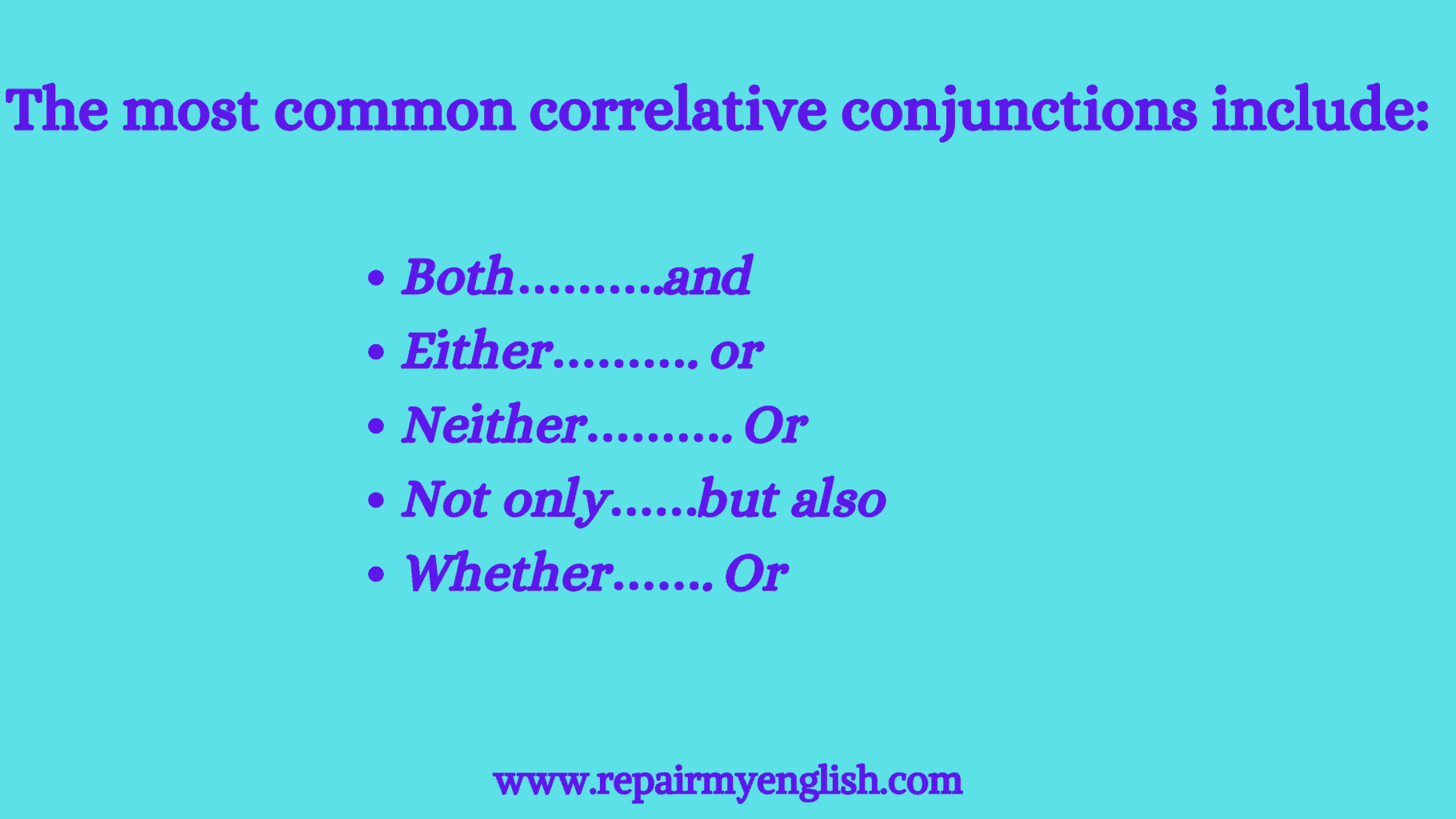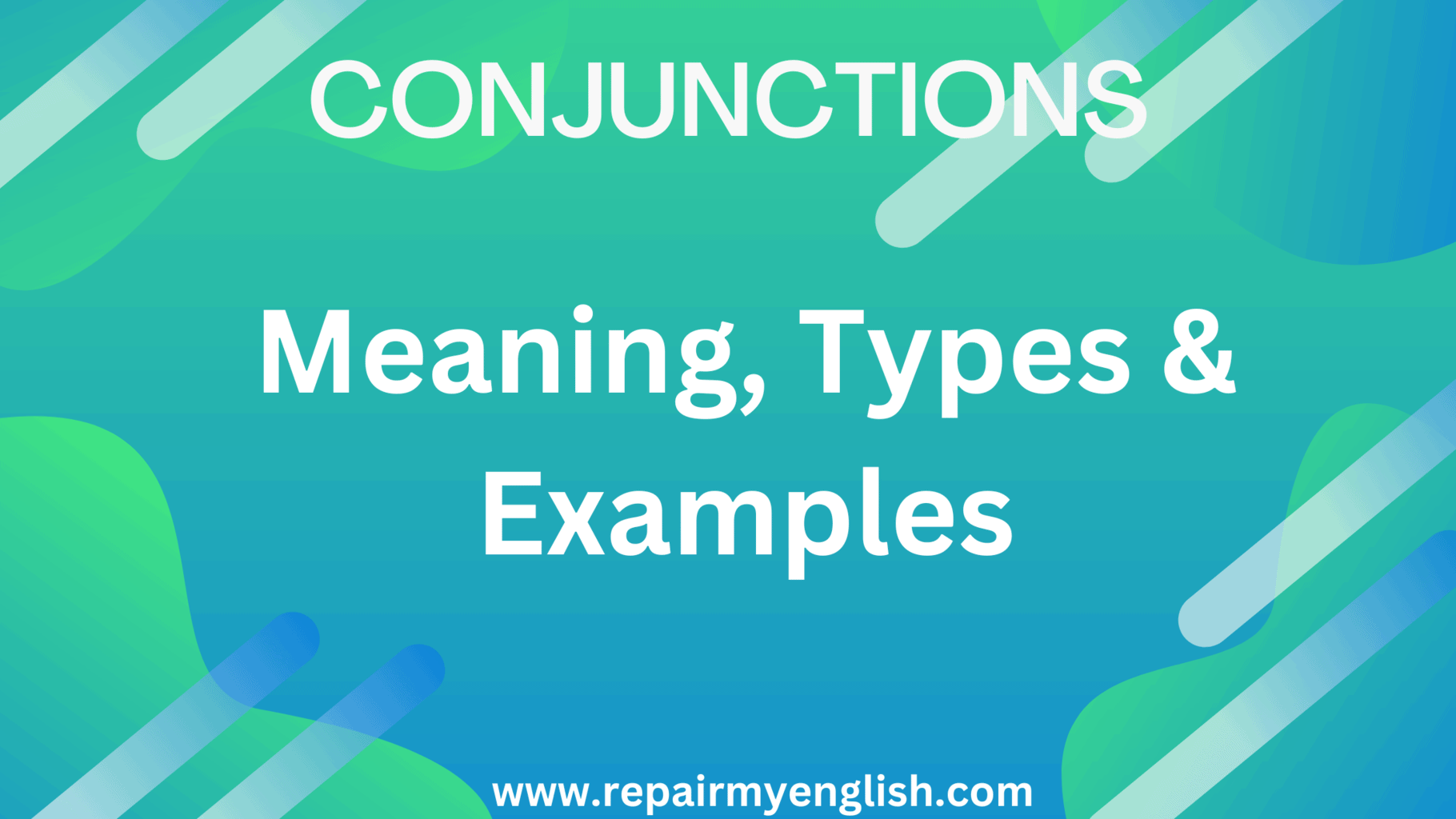- What are Conjunctions?
- Importance of Conjunctions in English Grammar
- Examples of Conjunctions.
- Types of Conjunctions?
- What are Coordinating Conjunctions?
- Example Sentences of Coordinating Conjunctions
- What are Subordinating Conjunctions?
- Example Sentences of Subordinating Conjunctions
- What are Correlative conjunctions?
- Example Sentences of Correlative Conjunctions
- Difference between subordinating and coordinating conjunctions
Lets discuss the meaning of conjunctions:
- What are Conjunctions?
Conjunctions are the words that join two phrases or sentences. They serve as linking or coordinating devices that establish relationships between different parts of a sentence. Conjunctions are an essential part of grammar and help to create coherent and meaningful sentences. Conjunctions are further divided into three parts.
Conjunctions Example Sentences:
- Kashish, as well as his sister, plays badminton.
- I went to Jaipur and saw Sheeh Mahal there.
- Renna is weeping because she is upset.
- I will finish my work before I leave the office.
Importance of Conjunctions in English Grammar
Conjunctions are essential in English grammar for several reasons:
Connecting Ideas:
Conjunctions help connect words, phrases, clauses, and sentences, allowing for the smooth flow of ideas. They enable us to express relationships between different parts of a sentence and establish logical connections. Without conjunctions, sentences appear disjointed, and the intended meaning may not be conveyed effectively.
2. Coordinating Information:
Coordinating conjunctions (such as “and,” “but,” “or,” etc.) are used to coordinate or join words, phrases, or clauses of equal importance. They help combine related information, provide additional details, and show the relationships between different elements. By using coordinating conjunctions, we can avoid repetitive sentence structures and create more concise and varied sentences.
3. Expressing Contrast or Choice:
Conjunctions like “but,” “yet,” “although,” “or,” “either…or,” and “neither…nor” are used to express contrast, choice, or alternative options. They allow us to present contrasting ideas, make distinctions, or provide alternatives within a sentence or across different sentences.
4. Indicating Cause and Effect:
Subordinating conjunctions (such as “because,” “since,” “as,” “if,” etc.) are used to introduce dependent clauses that provide reasons, causes, conditions, or concessions. They help express cause-and-effect relationships, explain, or establish the circumstances under which something happens.
5. Organizing Complex Sentences:
Conjunctions are crucial for constructing complex sentences with multiple clauses. By using conjunctions, we can join independent and dependent clauses, creating more sophisticated sentence structures. This allows for the expression of complex thoughts, relationships, and ideas.
6.Enhancing Coherence:
Conjunctions contribute to the overall coherence and clarity of a piece of writing. They help create logical connections between sentences and paragraphs, ensuring that ideas are presented cohesively. Effective use of conjunctions improves the readability and comprehension of written or spoken language.
In short, conjunctions are essential in English grammar because they connect ideas, coordinate information, express contrast or choice, indicate cause and effect, organize complex sentences, and enhance overall coherence. By using conjunctions appropriately, we can convey our thoughts effectively, create well-structured sentences, and improve the clarity of our communication.
Types of Conjunctions:

Coordinating conjunctions are single words that connect words, sentences, or related parts.
Subordinating conjunctions connect related words, sentences, or elements but only come in pairs.
Correlative conjunctions are adverbs that function as a conjunction.
Let us discuss the correlative, conjunctive adverbs, coordinating and subordinating conjunctions in detail:
Coordinating Conjunctions:
These conjunctions can quickly be learned by using the pneumonic technique “FANBOYS”:

Coordinating Conjunctions Example Sentences: | ||
| F | For | She came back to take an umbrella for it was raining outside. |
| A | And | I wore a business suit and went for the interview. |
| N | Nor | She can’t sing, nor can she dance. |
| B | But | He is poor but honest. |
| O | Or | Do you like pizza or pasta? |
| Y | Yet | We were enjoying the trip, yet we wanted to go back home. |
| S | So | We went to the party last night and were exhausted the following day. |
For- Stands for reason
- He didn’t eat dinner, for he wasn’t hungry.
- They canceled the event for the weather was terrible.
- She decided to take the day off, for she was feeling unwell.
- The game was postponed, for the field was flooded.
- She couldn’t attend the meeting, for she was stuck in traffic.
And
- Dr. Bansal entered the class and distributed the brochures.
- My two favorite fruits are pomegranate and papaya.
- I invited Mike and Jessica to my bracteolate party.
- Aishwarya looks confident and intelligent during interviews.
- My parents practice yoga and meditation every day.
Nor
- I do not like dancing, nor do I enjoy singing.
- Her family has never been to the USA, nor have they been to Europe.
- Her daughter does not eat fruits, nor does she eat vegetables.
- My father does not like hill stations, nor does he like historical places.
- He never smokes cigarettes, nor does he consume alcohol.
But
- She was happy with her performance, but her mother was disappointed.
- Her daughter enjoys fast food but hates fruits and salads.
- He wanted to go on the trip, but his parents refused.
- Mike wanted to join the party but got stuck in the jam.
- I enjoy visiting hill stations but hate hiking in the woods.
Or
- Wind up the session, or you will miss the plane.
- What would you like to take? Soft drink or hard drink.
- You can take escalators or lift to go to the 5th floor.
- Students can pick a physical or online exam to get a certificate for the course.
- I can’t decide whether I should learn French language or German Language.
Yet
- Seema worked hard for the IIT exam, yet she failed.
- His son is allergic to grass, yet he always plays barefoot in the playground.
- She is the best speaker in the school, yet she hesitates to perform in competitions.
- I saved a reminder for my best friend’s birthday, yet I forgot to wish him.
- His ankle got twisted, yet he won the race.
So
- It was raining heavily so I booked a cab to reach the office.
- We got bored while sitting at home, so we went shopping.
- I have good writing skills, so I always complete my writing assignments in the early hours.
- My phone was not working properly so I sent it for repair.
- The vegetable market was closed due to covid-19, so I went to local vendors to buy vegetables.
Correlative Conjunctions:
Correlative conjunctions are pairs of words that work together to join two elements of equal importance within a sentence. These conjunctions are used to show a relationship between two ideas or clauses. The most common correlative conjunctions include:

Correlative Conjunctions Example Sentences:
Both…and: It connects two similar elements or ideas.
Example: Both Sarah and John went to the party.
Either…or: It presents a choice between two options.
Example: You can either stay at home or come with us.
Neither…nor: It expresses a negative relationship between two elements.
Example: Neither Jane nor Mark likes broccoli.
Not only…but also: It emphasizes additional information or alternatives.
Example: She is not only intelligent but also talented.
Whether…or: It introduces alternatives or options.
Example: I’m not sure if he’ll show up or not.
Coorelative Conjunctions:
These correlative conjunctions help maintain parallel structure and balance in sentences. They are used to connect words, phrases, or clauses, ensuring that the parts they join have a similar grammatical form and equal importance.
Let us discuss correlative conjunctions example sentences:
| Correlative Conjunctions | Example Sentences: |
| Not only……but also | Reena speaks not only French but also German. |
| Both……….and | We have both Club House and Gym in our society. |
| Whether………or | Rohit is unsure whether he should study in India or move abroad. |
| Either…………or | You should either buy this dress or the shoes. |
| Neither………. or | He is neither greedy nor dishonest. |
Not only……but also
- Her mentors not only support her but also motivate her.
- Mike is not only intelligent but also hard-working.
- Meera not only sings but also dances well.
- My uncle is not only a businessman but also a social activist.
- He not only writes film scripts but also produces them.
Both……….and
- Both Principal and the Head of the Department deliver one lecture every day.
- Youngsters prefer both Hot Star and Netflix as a source of entertainment.
- Both students and teachers speak French fluently.
- I will take both tea and cookies for breakfast.
- Reena writes both essays and short stories for the magazine.
Whether…….or
- I am confused whether I go to Bali or Goa to celebrate New Year.
- Whether I work remotely or join the office, I will get a full-time experience certificate.
- I can’t decide whether I buy a pullover or cardigan for the party.
- We are confused about whether to buy a flat or a house.
- Whether my parents like it or not, I will choose my career path.
Either……….or
- I will either go to Goa or Bali in the summer vacation.
- Either Joseph or Varun will receive the scholarship this year.
- We will either go shopping or watch a movie in the theatre.
- All my friends will either go to Canada or Australia for higher education.
- Either Jack or Aleena will win the debate competition.
Neither……….nor
- Rosey is neither intelligent nor hard-working.
- She neither sends any messages nor calls me up.
- I neither like cabbage nor lettuce in my grilled sandwich.
- Neither her son nor her daughter takes a bath in the winter.
- Neither the teachers nor the students work on weekends.
Subordinating conjunctions:
Subordinating conjunctions are divided into seven categories based on how they link independent and dependent sentences. The relationship between the independent and dependent clauses is distinct for each form of a subordinating conjunction.
Consider the following subordinating conjunction example sentences:
Contrast or Concession:
- Although I was exhausted, I kept working.
- He completed his race despite the wounded leg.
Condition:
- I will go with you if you accompany me.
- Unless he apologizes for his misbehavior, I won’t talk to him.
Time:
- The patient had passed away before the doctor came.
- You should wait here till I return.
Reason:
- He failed because he didn’t prepare for the exam.
- As you were studying, I didn’t disturb you.
Manner:
- My grandmother taught me how to cook Indian food.
- They packed their luggage as though they were moving abroad.
Place:
- Rohit lives in the same house where his father spends most of his life.
- You can organize the food stall wherever you like.
Comparison:
- John likes white pasta, whereas Jack prefers red pasta.
- Maya loves shopping, whereas her husband likes staying at home.
Difference between subordinating and coordinating conjunctions:
The main difference between subordinating and coordinating conjunctions lies in the relationships they establish between clauses or sentence elements:
Coordinating Conjunctions:
Purpose: Coordinating conjunctions connect words, phrases, or independent clauses of equal importance.
Relationship: They join elements that are grammatically and semantically similar or parallel.
Examples: “for,” “but,” “or,” “nor,” “and,” “so,” “yet.”
Example sentence: “I like to swim, and he likes to run.”
Subordinating Conjunctions:
Purpose: Subordinating conjunctions introduce dependent clauses, which cannot stand alone as complete sentences.
Relationship: They establish a relationship of dependence or hierarchy between the dependent clause and the main clause.
Examples: “because,” “although,” “since,” “when,” “while,” and “if.”
Example sentence: “I will go to the party if I finish my work.”
Here are some key points to further highlight the differences:
Coordinating conjunctions connect elements of equal importance, while subordinating conjunctions introduce dependent clauses subordinate to the main clause.
These conjunctions join independent clauses or coordinate elements within a sentence while subordinating conjunctions connect a dependent clause to an independent clause.
They create compound sentences while subordinating conjunctions are used to form complex sentences.
Coordinating conjunctions emphasize coordination and parallelism while subordinating conjunctions highlight subordination and the relationship between clauses.
In summary, coordinating conjunctions connect equal elements, whereas subordinating conjunctions introduce dependent clauses and establish a relationship of dependence or hierarchy between clauses.
For Related Topics visit our Grammar Page:

